Bill Hicks: The Message
Bill Hicks: The Message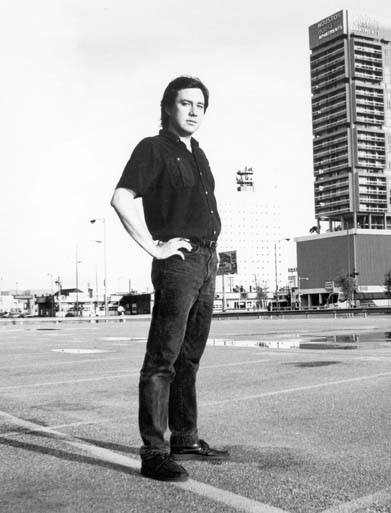
There was something different about Bill Hicks. This is a sentiment shared by many who have looked back in wonder and awe at the work and life of a man who has been arguably canonised as one of the most prolific and inspiring comedians of all time. He was not simply a comic, or indeed “the comedian’s comedian”. He had something to say, or perhaps more accurately, something to shout about.
Many have made reference to the implicit “mission” or “message” inherent within his work. Although Hicks himself on many occasions denied any such agenda, it is clear that his comedy continues to resonate with many people at a deep emotional and psychological level, arguably given the recurring fundamental principles that lie as a foundation to his work.
As Bill’s mother, Mary Hicks, once aptly put it “What Bill said will never change, because it is the basic truths, and they are never wrong”.
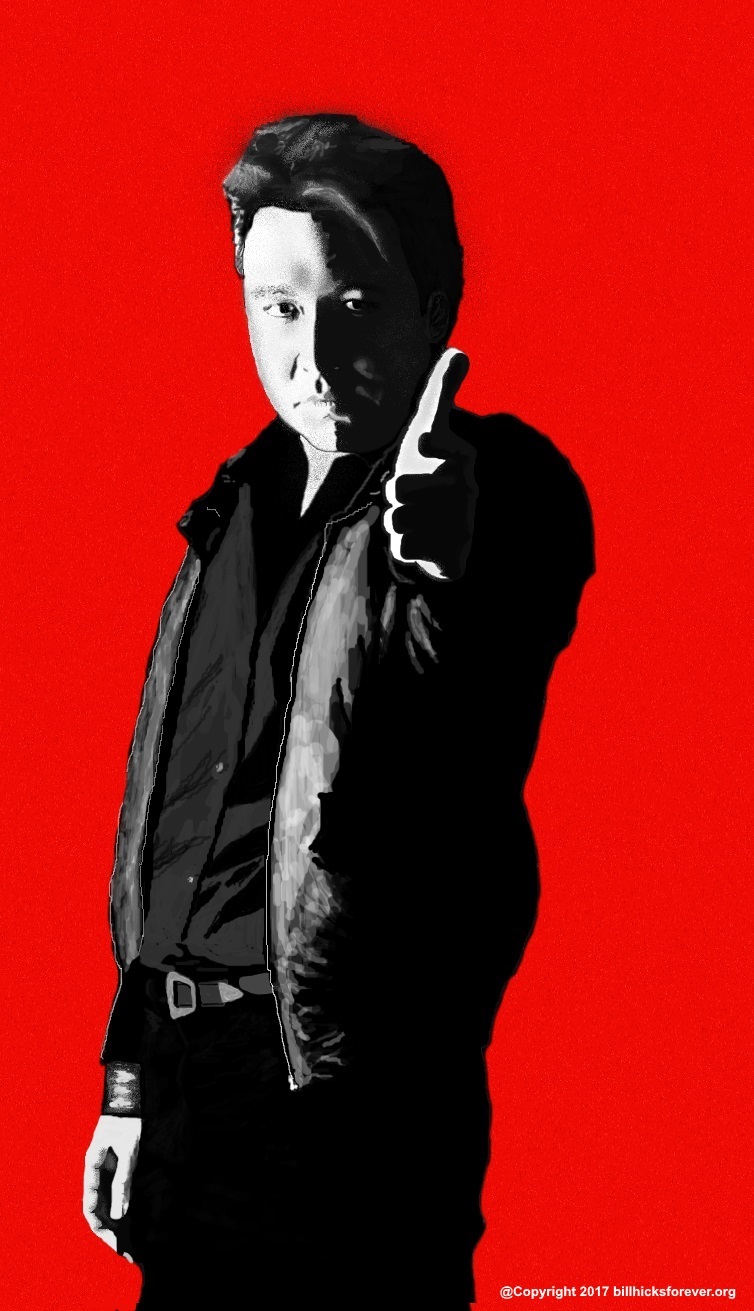 The Beauty of Defiance
The Beauty of Defiance
For many fellow comedians, Bill Hicks continues to serve as a touchstone, a vital reminder of the wider social and moral currency that good comedy offers. Realising from a young age the wider import of stand-up comedy as a channel of social, political and philosophical commentary, Hicks once remarked that “comedy is the last bastion of free speech” and in explaining the reasoning for the title of his album “Dangerous” quoted Thomas Jefferson in stating that “No idea is dangerous to society wherein that idea can be openly discussed”. A world in which “freedom of expression is guaranteed if you’ve got the money” was simply not acceptable to Hicks. He stood unflinchingly behind his right, and perhaps even more crucially, everybody’s right to exercise freedom of speech whilst embodying the rebellion of ramping up the volume just a little in the face of attempts to quell such rights. Arguably, his material took root in a relentless and unswerving conviction that the true art of comedy lay in its power as a channel of free expression and that in so being, hearts and minds could be challenged, worlds could be transformed, and horizons could be expanded. Hicks was a creature of extremes, and his full-throttle approach to life without doubt translated into his performances. His routines constituted no less than masterful demonstrations of dramatic theatre, involving the utilisation of every physical and linguistic weapon in his arsenal, ultimately aimed at liberating audiences from the chains of social and political constraint they often unwittingly found themselves increasingly subject to. Having studied Greek theatre, Hicks was impressed with its incorporation of graphic content relating to sex and bodily functions as a means of allowing Greeks to release “the demons of shame from their bodies”. To Hicks, open and unrestricted expression was a “direct reaction to a fundamentalist Christian, puritanical attitude that is shoved down our throats, which obviously keeps these secrets locked away and forms abhorrent behaviour”. The “way to recovery” from Hicks’ point of view lay in “acceptance, not denial” and celebration of those parts of ourselves that we have been socially conditioned to fear, reject or suppress, best achieved through the free expression that mediums such as stand up comedy offer.
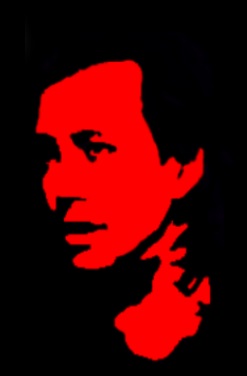
To the untrained eye and ear, Hicks’s routines could be perceived as aggressive, offensive or even at times gratuitously vulgar. Nothing, however could be further from the truth upon examining the man and the principles of the man that lay behind Bill Hicks’ comedy. Whilst television and radio seemed inextricably bound by corporately fuelled regulations, rules and sometimes unfathomable standards of practice, the gritty, smokey, grounded environment of the comedy club implicitly provided a source of liberation from such restraints. Left to its own devices, stand-up comedy can divide or unite, assault or appease, animate or subdue, suppress or liberate. Arguably, Bill Hicks did all of these things, and often all within the same given performance, promising an emotional and psychological roller-coaster ride like no other. Bill Hicks was a diamond in the rough, a formidable force that could not be contained, defying gravity to uproot itself through self-ignited force, screaming for salvation in a world that was barely ready for what he had to offer it. Beneath that oftentimes brutal and terrifying exterior, lay the heart of a man mercilessly determined to drag his audience to the altar of its own capacity, to at last face its full potential.
Beyond the Event Horizon
At the core of Hick’s message was a philosophical call to arms for humanity to realise its maximum capability and exercise it. His appeals appeared rooted in a deep sense of frustration and core belief that the human race as a whole had somehow surrendered its true value in favour of the seductive triviality of consumerism and banality. Hicks implored us to consider that somewhere along the sacred path of nurturing and claiming its greatest treasure, humanity had missed its calling, becoming instead distracted by the alluring music of the pied piper of corporately fueled illusion. Hicks offered a smoke signal, to warn of the dangers of settling for a life of mediocrity and materialism. He urged us to consider that “We are better and more unique creatures than this and all eternity is our playground”, whilst reminding us that “evolution doesn’t stop with us growing opposable thumbs”. He feverishly grabbed us by the lapels whilst demanding that we “go and find a fucking soul!!”, and reflect on the fact that when we catch ourselves thinking we are being all that we should and could be, we should instantly enquire, question and search for the next step in our personal development. He presented a simple choice “between fear and love”, and insisted that we keep upping our game, and continue striving for that day that we “get on the spaceships and get out of here”.
A self-proclai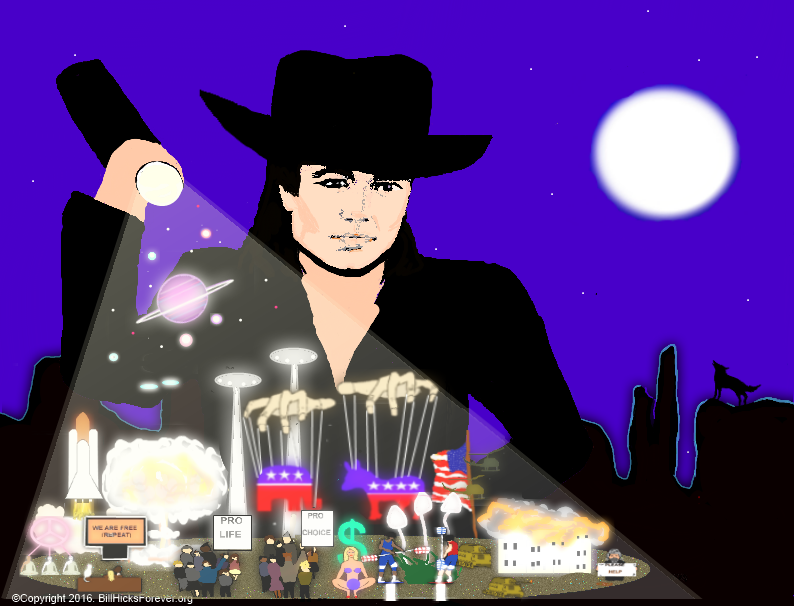 med misanthrope, Hicks, despite his eternal frustration and sense of alienation in a world that often did not echo his spirit and foresight, honoured a calling for the world to awaken to all of its possibility, whilst symbolically on a creative level through his craft, leaving no horizon uncharted or territory un-rendered. Implicitly, through the cutting edge nature of his material and the raw, cut-throat style he adopted in delivering it, Bill Hicks personified pushing the boundaries beyond the expected, beyond the acceptable, and invited others to question the limits they had been taught. Critics of Hicks’s work have often reflected on the romantic, utopian nature of the ideas and concepts interwoven into the rich tapestry of his act. On being asked by one interviewer about where you draw the line within comedy, Hicks replied “There are no lines, there are no lines. I say erase all the lines”. Bill Hicks encouraged audiences to transcend the confines of the world they had been born to and to create an alternative reality of endless possibility.
med misanthrope, Hicks, despite his eternal frustration and sense of alienation in a world that often did not echo his spirit and foresight, honoured a calling for the world to awaken to all of its possibility, whilst symbolically on a creative level through his craft, leaving no horizon uncharted or territory un-rendered. Implicitly, through the cutting edge nature of his material and the raw, cut-throat style he adopted in delivering it, Bill Hicks personified pushing the boundaries beyond the expected, beyond the acceptable, and invited others to question the limits they had been taught. Critics of Hicks’s work have often reflected on the romantic, utopian nature of the ideas and concepts interwoven into the rich tapestry of his act. On being asked by one interviewer about where you draw the line within comedy, Hicks replied “There are no lines, there are no lines. I say erase all the lines”. Bill Hicks encouraged audiences to transcend the confines of the world they had been born to and to create an alternative reality of endless possibility.
The Sanctity of Truth
It is easy to distinguish Hicks’ work from that of many of his peers given its cuttingly insightful, unabashedly honest and prophetic quality. Hicks was ahead of his time in calling out what he saw to be a cultural and societal hall of mirrors, created by world politicians and fuelled by mainstream media, which he felt was designed to compel people into a fear-driven and intentionally skewed version of reality with the ultimate purpose of keeping humanity “stupid, docile and apathetic”. To Hicks, taking the easy road within comedy of airline and “dick jokes” constituted a wasted opportunity when there was so much to be said about what he regarded to be an increasingly dysfunctional world.
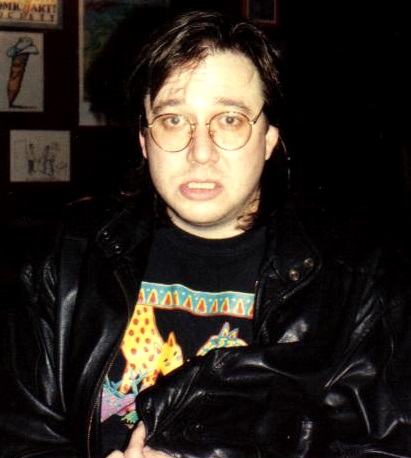 Hicks proposed that “Comics are kind of doorways to a different understanding of a very mixed up and depressing world” and that comedy itself “re-frames reality in a positive light”. To Hicks, good comedy constituted taking “a light into the darkened corners of people’s minds, exposing them to the light” and thus compelling people to question the reality that they find themselves in. He demonstrated with such clarity the confusion which ensues when attempting to marry our normal everyday life experience and common sense with the mainstream media’s portrayal of everyday life through use of the media-fuelled imagery of “War, famine, death AIDS, homelessness, depression, recession” starkly contrasted against the hypnotic chirping of crickets that greets you as you open your porch-door to the dusky night. Arguably, one of Hicks’ greatest gifts lay in his cutting objectivity, his ability to survey and reflect to audiences the simultaneously vague but glaringly obvious disparity between what that age old inner voice tells us to be true and the apparent truth that is presented to us through the mainstream entertainment based “purile scat” we are subject to on a daily basis. Hicks once asserted “when two or more people agree on an issue, I form on the other side”, implicitly urging us to step back from the media-bombarded consensus and question where the truth ultimately lies.
Hicks proposed that “Comics are kind of doorways to a different understanding of a very mixed up and depressing world” and that comedy itself “re-frames reality in a positive light”. To Hicks, good comedy constituted taking “a light into the darkened corners of people’s minds, exposing them to the light” and thus compelling people to question the reality that they find themselves in. He demonstrated with such clarity the confusion which ensues when attempting to marry our normal everyday life experience and common sense with the mainstream media’s portrayal of everyday life through use of the media-fuelled imagery of “War, famine, death AIDS, homelessness, depression, recession” starkly contrasted against the hypnotic chirping of crickets that greets you as you open your porch-door to the dusky night. Arguably, one of Hicks’ greatest gifts lay in his cutting objectivity, his ability to survey and reflect to audiences the simultaneously vague but glaringly obvious disparity between what that age old inner voice tells us to be true and the apparent truth that is presented to us through the mainstream entertainment based “purile scat” we are subject to on a daily basis. Hicks once asserted “when two or more people agree on an issue, I form on the other side”, implicitly urging us to step back from the media-bombarded consensus and question where the truth ultimately lies.
The bottom line was always to Hicks very simple – honesty. He summed this up eloquently in his assertion “I don’t care if you are disgusting, offensive and filthy as long as you’re honest”. His passionate adherence to the principle of truth was clearly reflected through his outspoken stance against events such as the Iraq “war” (the type of war that involves just one army of course) and the US government’s official explanation for the destruction of David Koresh’s Branch Dividians compound in Waco, Texas, which resulted in the death of Koresh himself and 79 others, women and children included. Hicks once proposed that his comedy was born of questioning “anything that defies my voice of reason” with the ultimate objective of producing “a laughter of recognition and truth”, and in the depths of his passion proclaimed to us that we are right as opposed to “those fuckers who want to tell you what to think. The message here, it seems, was clear – that we should constantly question and enquire truths as they are offered to us, particularly from the powers that be, but ultimately always follow our inner voice in this quest. After all, as Hicks himself suggested, “There are a lot of ways to look at the world. Why pick the way you learn over T.V cause its usually wrong?”
Not only did Bill Hicks leave in “love, laughter and truth”, but he also lived by these values, and shared them with an intoxicating passion that has rarely been seen since his untimely passing over 20 years ago. Whether or not you are a fan, one thing cannot be denied, Bill Hicks delivered with beauty and precision just what he intended to: to provoke thought and action and to remind his fellow brothers and sisters that “outer space awaits our presence”.
Perhaps we should leave the final word to the man himself however. As Hicks eloquently but humbly put it: “Do I have a message? Yes, I do. Here is my message: as scary as the world is – and it is – it is merely a ride…”
Top right photo: Used with kind permission of David Johndrow
Bottom right photo: Bill_Hicks_at_the_Laff_Stop_in_Austin,_Texas,_1991_(2).jpg: Angela Davis (Angela D.) from Austin, TX, USA derivative work: RanZag [CC BY 2.0 (http://creativecommons.org/licenses/by/2.0)], via Wikimedia Commons

 The Beauty of Defiance
The Beauty of Defiance med misanthrope, Hicks, despite his eternal frustration and sense of alienation in a world that often did not echo his spirit and foresight, honoured a calling for the world to awaken to all of its possibility, whilst symbolically on a creative level through his craft, leaving no horizon uncharted or territory un-rendered. Implicitly, through the cutting edge nature of his material and the raw, cut-throat style he adopted in delivering it, Bill Hicks personified pushing the boundaries beyond the expected, beyond the acceptable, and invited others to question the limits they had been taught. Critics of Hicks’s work have often reflected on the romantic, utopian nature of the ideas and concepts interwoven into the rich tapestry of his act. On being asked by one interviewer about where you draw the line within comedy, Hicks replied “There are no lines, there are no lines. I say erase all the lines”. Bill Hicks encouraged audiences to transcend the confines of the world they had been born to and to create an alternative reality of endless possibility.
med misanthrope, Hicks, despite his eternal frustration and sense of alienation in a world that often did not echo his spirit and foresight, honoured a calling for the world to awaken to all of its possibility, whilst symbolically on a creative level through his craft, leaving no horizon uncharted or territory un-rendered. Implicitly, through the cutting edge nature of his material and the raw, cut-throat style he adopted in delivering it, Bill Hicks personified pushing the boundaries beyond the expected, beyond the acceptable, and invited others to question the limits they had been taught. Critics of Hicks’s work have often reflected on the romantic, utopian nature of the ideas and concepts interwoven into the rich tapestry of his act. On being asked by one interviewer about where you draw the line within comedy, Hicks replied “There are no lines, there are no lines. I say erase all the lines”. Bill Hicks encouraged audiences to transcend the confines of the world they had been born to and to create an alternative reality of endless possibility. Hicks proposed that “Comics are kind of doorways to a different understanding of a very mixed up and depressing world” and that comedy itself “re-frames reality in a positive light”. To Hicks, good comedy constituted taking “a light into the darkened corners of people’s minds, exposing them to the light” and thus compelling people to question the reality that they find themselves in. He demonstrated with such clarity the confusion which ensues when attempting to marry our normal everyday life experience and common sense with the mainstream media’s portrayal of everyday life through use of the media-fuelled imagery of “War, famine, death AIDS, homelessness, depression, recession” starkly contrasted against the hypnotic chirping of crickets that greets you as you open your porch-door to the dusky night. Arguably, one of Hicks’ greatest gifts lay in his cutting objectivity, his ability to survey and reflect to audiences the simultaneously vague but glaringly obvious disparity between what that age old inner voice tells us to be true and the apparent truth that is presented to us through the mainstream entertainment based “purile scat” we are subject to on a daily basis. Hicks once asserted “when two or more people agree on an issue, I form on the other side”, implicitly urging us to step back from the media-bombarded consensus and question where the truth ultimately lies.
Hicks proposed that “Comics are kind of doorways to a different understanding of a very mixed up and depressing world” and that comedy itself “re-frames reality in a positive light”. To Hicks, good comedy constituted taking “a light into the darkened corners of people’s minds, exposing them to the light” and thus compelling people to question the reality that they find themselves in. He demonstrated with such clarity the confusion which ensues when attempting to marry our normal everyday life experience and common sense with the mainstream media’s portrayal of everyday life through use of the media-fuelled imagery of “War, famine, death AIDS, homelessness, depression, recession” starkly contrasted against the hypnotic chirping of crickets that greets you as you open your porch-door to the dusky night. Arguably, one of Hicks’ greatest gifts lay in his cutting objectivity, his ability to survey and reflect to audiences the simultaneously vague but glaringly obvious disparity between what that age old inner voice tells us to be true and the apparent truth that is presented to us through the mainstream entertainment based “purile scat” we are subject to on a daily basis. Hicks once asserted “when two or more people agree on an issue, I form on the other side”, implicitly urging us to step back from the media-bombarded consensus and question where the truth ultimately lies.
